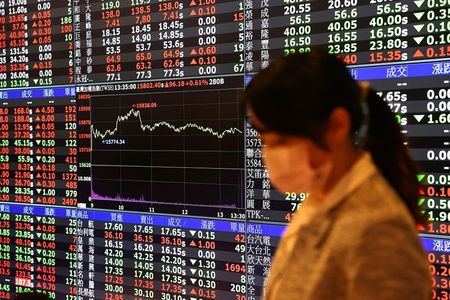Asian Stocks Turn Red Ahead of the Fed
2022.09.18 22:56
[ad_1]

By Ambar Warrick
Investing.com– Most Asian stock markets fell on Monday as investors fled risk-driven assets ahead of a U.S. Federal Reserve meeting later this week, while a holiday in Japan made for diminished trading volumes.
Most major bourses in Asia extended losses from last week, with a two-day Fed meeting, starting on Tuesday, widely expected to result in a 75 basis point (bps) interest rate hike.
Concerns over the hike battered stock markets last week, as expectations for a hawkish move were cemented by hotter-than-expected U.S. inflation data.
Traders are also pricing in the possibility of a surprise 100 bps hike by the Fed, given the stubbornness of U.S. inflation. Focus will also be on the Fed’s inflation expectations, which are likely to guide monetary policy for the remainder of the year.
Hong Kong’s technology-heavy index was the worst performer among its peers on Monday, losing 1.2% on losses in majors Baidu (HK:), Alibaba (HK:), and Tencent (HK:). South Korea’s also lost 0.9%.
China’s and indexes fell slightly lesser than their peers after Southern megacity Chengdu on Monday. The move is expected to help spur a recovery in Chinese economic activity.
The People’s Bank of China also on Monday, and increased its rate of cash injections into the economy as it acts to revive growth in the country.
Chinese stocks have been somewhat underpinned in recent months by expectations that Beijing will continue to increase spending and loosen policy to revive economic growth. The Communist Party recently signaled that it would ramp up stimulus measures in the ongoing quarter.
Economic readings from China show that the country is struggling with slowing growth and dimming prospects due to its strict zero-COVID policy.
Asian markets are also focusing on central bank meetings in , and this week for more cues on how central bankers intend to tackle rising inflation.
But while Philippines and Indonesia are expected to raise rates, the Bank of Japan has so far signaled no such intent, given that the Japanese economy is still reeling from the COVID-19 pandemic.
[ad_2]
Source link








